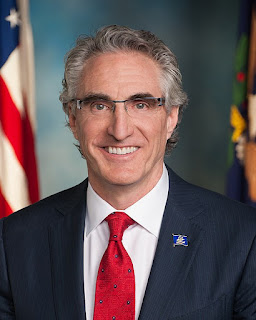May 17, 2023
US Supreme Court Upholds Indiana's Law Requiring Humane Treatment of Fetal Remains
May 16, 2023
New Vermont Law Allows Non-Residents to Die by Assisted Suicide
May 15, 2023
DeSantis Signs Bill Protecting Conscience Rights
May 12, 2023
Ohio Legislature Approves Amendment to Increase Majority Needed to Amend Constitution
The Ohio Senate had already approved the resolution. The House made some changes, but the Senate quickly approved them after the House voted on May 10.
The resolution would also require citizen-driven ballot initiatives that would amend the Ohio constitution to collect signatures from all 88 counties.
Pro-abortion groups argue that it is not legal for the Ohio legislature to create an August special election by way of joint resolution rather than state law. If the resolution is challenged in court, it may prevent the August special election from taking place.
Pro-life advocates pushed for the resolution after pro-abortion groups submitted a ballot measure for an amendment that would create a constitutional right to abortion in the state. Pro-abortion groups are still gathering the signatures required to place that amendment on the state's November ballot. They face a deadline of July 5 to collect the necessary signatures.
The proposed pro-abortion amendment is also facing a lawsuit from pro-life groups who argue that it should be split into several separate proposals. As written, the amendment would create rights to contraception, fertility treatment, continuing one's own pregnancy, miscarriage care, and abortion.
May 11, 2023
Maryland Gov Signs Pro-Abortion Bills
 |
| Maryland Gov Wes Moore (D) |
May 10, 2023
Judge Blocks Utah Law Banning Abortion Businesses
May 9, 2023
Granite City Abortion Clinic Hospitalizes Four Women in Two Months
 |
| patient being wheeled into an ambulance outside Hope Clinic for Women on March 16, 2023 |
May 8, 2023
Montana Gov. Signs Pro-Life Bills
 |
| Montana Gov. Greg Gianforte (R) |
- the Infant Care and Safety Act, which provides legal protections for children born alive during attempted abortions. The law reinforces protections for children born during attempted abortions by requiring medical professionals to provide the same level of care that would be provided to other children born at the same gestational age. This legislation protects abortion survivors from being left to die if they are born alive during attempted abortions.
- legislation prohibiting abortion after 24 weeks gestation. It contains an exception for instances when the mother's life is in danger.
- legislation requiring abortion businesses to report adverse events that occur during the use of abortion pills. The federal government only requires abortion businesses to report fatal adverse events.
- legislation reinforcing conscience protections for medical professionals. These protections make sure medical professionals have the right to refuse to perform abortions or prescribe certain kinds of drugs.
- legislation preventing state tax dollars from being used to fund elective abortions.
May 5, 2023
Danville, IL Passes Sanctuary City for the Unborn Ordinance
 |
| photo credit: Mark Lee Dickson / Facebook |
May 4, 2023
Kansas Legislators Override Pro-Abortion Governor's Vetoes
May 3, 2023
Vermont and Washington Pass Bills to Allow Mifepristone if FDA Approval Ends
May 2, 2023
ERA Revival Resolution Defeated Again in US Senate
May 1, 2023
Des Plaines Abortion Clinic Waits Five Hours to Call 911 for Hemorrhaging Patient
 |
| American Women's Medical Center in Des Plaines, IL |
April 28, 2023
Update on SB1909
Danville City Council Advances "Sanctuary City for the Unborn" Ordinance
North Dakota Gov. Signs Law to Clear Up Language in "Trigger" and Heartbeat Laws
 |
| North Dakota Gov. Doug Burgum (R) |
North Dakota Supreme Court Chief Justice Jon Jensen wrote in the majority decision last month, “While the regulation of abortion is within the authority of the legislature under the North Dakota Constitution, RRWC has demonstrated likely success on the merits that there is a fundamental right to an abortion in the limited instances of life-saving and health-preserving circumstances, and the statute is not narrowly tailored to satisfy strict scrutiny.”
The new legislation intends to clean up language in the state's "trigger" bill and heartbeat bill so that they will survive judicial scrutiny. Under the new standards, abortion would be prohibited at all gestational ages with exceptions for women facing "death or serious health risk." There is also an exception to allow abortion in cases of rape or incest during the first six weeks of gestation.
This bill clarifies and refines existing state law which was triggered into effect by the (U.S. Supreme Court) Dobbs decision and reaffirms North Dakota as a pro-life state,” Gov. Burgum said in a statement.
April 27, 2023
Des Plaines Abortion Clinic Nearly Kills Patient by Fentanyl Overdose
 |
| American Women's Medical Center in Des Plaines, IL |
April 26, 2023
Mississippi Gov Signs Group of Pro-Life Laws
 |
| Mississippi Gov. Tate Reeves (R) |
April 25, 2023
Court Suspends Enforcement of Colorado Abortion Pill Reversal Ban
April 24, 2023
Supreme Court Returns Abortion Pill Challenge to 5th Circuit
The Supreme Court's 7-2 decision sent Alliance for Hippocratic Medicine v. U.S. Food and Drug Administration back to the 5th Circuit for a full hearing. That hearing is scheduled for May 17.
Justices Clarence Thomas and Samuel Alito dissented, arguing that the Biden DOJ and the abortion pill manufacturer Danco “are not entitled to a stay because they have not shown that they are likely to suffer irreparable harm in the interim.”
The lawsuit stems from a 2002 petition from doctors and pro-life groups challenging mifepristone's approval. That petition, which was stonewalled by the FDA for over 20 years, argued that the FDA unlawfully fast-tracked mifepristone's approval through a process intended for the treatment of life-threatening diseases. Further, the groups argue that the FDA's research does not support the drug's approval.
National Right to Life released a paper addressing seven myths about mifepristone's approval process and safety record. That paper can be viewed here.
The 5th Circuit ruling stayed by the US Supreme Court would have reverted mifepristone's regulatory status back to the standards used from 2000 to 2016. Those standards required in-person doctor visits, limited the abortion pill's use to the first seven weeks of pregnancy, prohibited the mail delivery of abortion pills, and required the abortion industry to report non-fatal adverse events.
Alliance Defending Freedom Senior Counsel Erik Baptist, who is representing the pro-life groups' challenge to the FDA, said the Supreme Court's decision was not unexpected.
“As is common practice, the Supreme Court has decided to maintain the status quo that existed prior to our lawsuit while our challenge to the FDA’s illegal approval of chemical abortion drugs and its removal of critical safeguards for those drugs moves forward,” Baptist said. “Our case seeking to put women’s health above politics continues on an expedited basis in the lower courts. The FDA must answer for the damage it has caused to the health of countless women and girls and the rule of law by failing to study how dangerous the chemical abortion drug regimen is and unlawfully removing every meaningful safeguard, even allowing for mail-order abortions. We look forward to a final outcome in this case that will hold the FDA accountable.”




.jpg)







